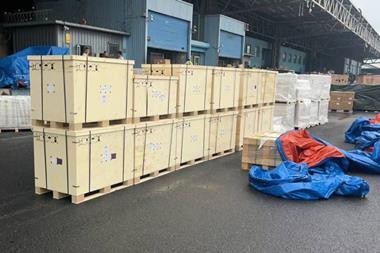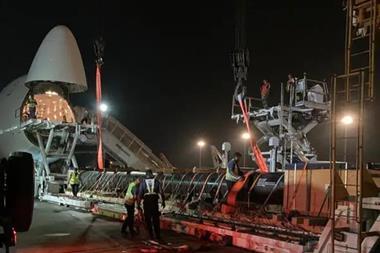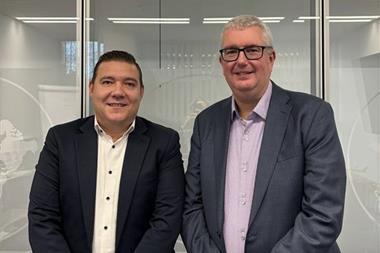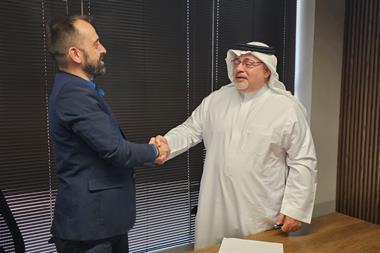
Chapman Freeborn has achieved a steady footing in the air cargo market by diversifying its business with e-commerce and now aims to expand its niche products.
Chapman Freeborn has been diversifying its business over recent years, and group chief executive Eric Erbacher says this has helped protect the firm from what has been a quiet year for the traditional cargo charter market.
Speaking to Air Cargo News, Erbacher says the company has been extremely busy with e-commerce over the past 12 months, a sector it would not have previously engaged with.
Chapman Freeborn’s ability to capitalise on the rapid growth in online shopping is helped by its ownership of freighter management firm Magma Aviation and the fact it is part of Avia Solutions Group (ASG), which has several freighter operating AOCs.
For example, in July last year, Magma opened a Middle East office in Dubai and took on an Airbus A321-200F and a Boeing 737-800F from ASG, in part to capitalise on e-commerce demand.
Magma also flies two scheduled charters a week from Hong Kong to Châteauroux and Liege carrying e-commerce with its Boeing 747 freighters.
“Plus, we flew a tremendous amount of charters this year for e-commerce, with various types of aircraft, Airbus A330, various Boeing 747 types, Boeing 777s…this year was really the year of e-commerce,” says Erbacher.
“Two years ago, who had heard of Temu? Suddenly Temu is all over and this is a company that was only launched in 2021.”
He adds: “We would not have previously engaged in e-commerce so at the start of [last] year we needed to make a decision, whether we should go into this segment or not,” he says.
“In the end, we decided that we would go into this segment and thank god we did it. We are very happy because you can see the other project business is, over the last two years, not as strong as we have seen it in the past.”
Erbacher says that Chapman Freeborn continues to fly on behalf of UN Agencies but ministry of defence (MOD) work has become less prevalent.
He explains that mandates to fly into Mali for MODs expired last year – it had been flying into the country almost daily for seven years – as foreign troops left the country as part of a United Nations peacekeeping withdrawal.
He adds that last year there were also not as many natural disasters as had been the case in 2023.
Despite this, Erbacher says that e-commerce has kept demand for Magma’s fleet of three Boeing 747 freighters high and the company would like to add more, although lease rates are currently very high due to a shortage of larger freighters.
Diversifying the fleet
Looking further ahead, fleet diversification is a priority. AviaAM Leasing, part of ASG, is the launch customer for Mammoth Freighters’ 777-300ERMF freighter conversion programme, having signed up for six of the aircraft in 2022.
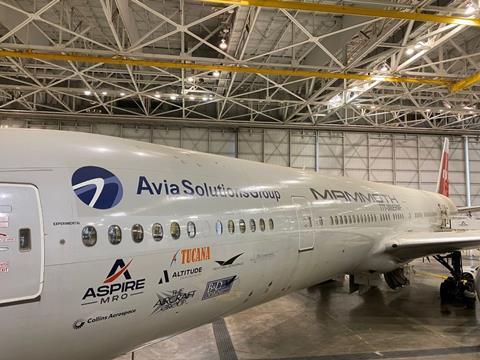
The first aircraft is due to join by December, with two more aircraft in 2026 and then the final three following in sequence. Erbacher says that Magma, along with another group member, will market this capacity.
“The 777 will have side loading doors but will be a very capable aircraft, especially for the e-commerce sector, they are highly fuel efficient, so we are excited for this,” he says.
“The timing is good for us, we want to increase our workforce, especially on the commercial side, and there is a strong expansion plan for our own controlled capacity (OCC), especially Magma. That is in a nutshell how we move.
“We are also looking at how to expand our niche products, such as on-board courier. We can see that these niche products are more resilient to external shocks than our core charter business.”
In the meantime, the company is looking into the possibility of adding medium widebody Boeing 767 or Airbus A330 freighters due to the high demand.
He says that although the cost of utilising a 767 on a longer flight is higher than a 777 due to the need for a technical stop to refuel, companies are willing to pay as there aren’t too many other options.
“There is an imbalance today and probably for the next two years, so the mid-sized aircraft, they have higher costs per unit, but the market accepts it because they need capacity – there is no option. Take it or leave it,” he says.
Another development at Chapman Freeborn in recent years has been the growth of the team.
Erbacher says that when he joined the company in 2020 there were just under 280 people. This has since increased to 450 members of staff and there are plans to grow further.
“We decided we want to scale up, we made that decision a couple of years ago,” he says.
“But the pressure is mounting on us. I remember when we were only 200 or so people it was much easier to manage a company of 200 people instead of 450 people. We want to be 1,000 people by 2030 so in just a few years from now.”

Photo: William Potter/ Shutterstock
Banking on e-commerce
Looking ahead, Erbacher says he expects the air cargo market to continue to be one of growth, with e-commerce playing an increasingly important role.
“It is an interesting market we are in at the moment, it is becoming more blurry. We don’t have these separations… integrator, forwarder, broker.
“And e-commerce is a new force, whether you like it or not, it is a huge reality. You only need to take a decision whether you want to participate or not.
“If you say no, it is well respected, but the growth is coming from e-commerce in the coming years, not from other segments.”
He adds that China+1 is another trend that should benefit air cargo, with more volumes, particularly textiles, being flown out of countries like Thailand, Dhaka and Bangladesh.
On the other hand, he expects the incoming Trump administration to follow through with its plans to implement tariffs and for a general rise in protectionism to have a negative effect on the market – although the extent of that is yet to be seen.
“We take the challenge as it is, we don’t need to gripe as to why tariffs are being imposed, we only have to live with the result and then design our own business model accordingly. The one who is the fastest and smartest will make the best of it.”










